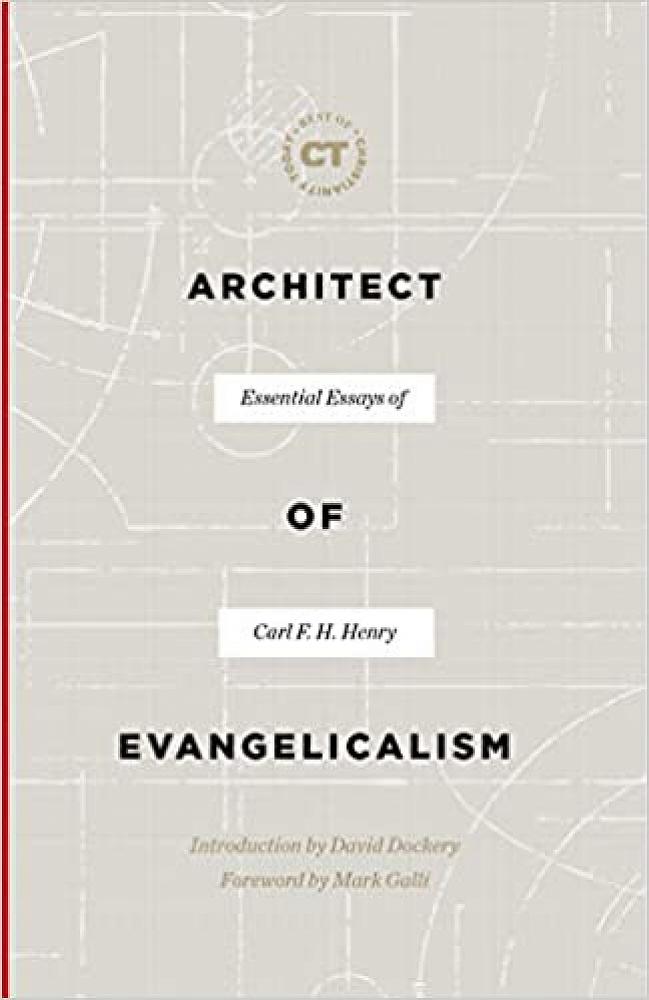
Book Review: Architect of Evangelicalism: Essential Essays of Carl F. H. Hentry
Mark Galli (Compiler), Lexham, MA: Lexham Press, 2019. ix + 421pp. ISBN: 978-1-6835-9336-2. $50.12.
Carl Henry (1913–2003), after coming to faith while a journalist, went on to gain doctorates in both theology and philosophy before joining the faculty of the recently founded Fuller Theological Seminary in 1947. In the same year, he published his first significant volume, The Uneasy Conscience of Modern Fundamentalism, whose title foreshadows his description as “Architect of Evangelicalism” – not least in his later role as founding editor of the still-influential journal, Christianity Today. This collection of 33 essays by Henry, published in Christianity Today over a span of 34 years, is arranged in four parts: “Defining Evangelicalism,” “Evangelicals and Modern Theology,” “Evangelicals and Education,” “Evangelicals and Society,” together with introductory and assessment chapters, and a very detailed index.
Who, in this part of the world, might benefit from reading this handsomely produced volume? They might well include those who are interested in:
Some of the decisive differences between evangelicals and both fundamentalists and liberals (slippery though those labels might continue to be). As the volume’s Introduction puts it, Henry saw evangelicalism as a “movement … best understood as a culturally engaged, historically shaped response to an empty and despairing mainline liberalism on the one hand and a doomed reactionary fundamentalism on the other.” (3) He was, in fact, a forerunner of the recent ‘generous orthodoxy’ meme.
A nuanced defence of the continuing centrality of the biblical witness in theological formation. Henry's six-volume God, Revelation, and Authority (1976-1983) became widely influential in shaping global evangelical beliefs about Scripture.
An appropriately critical engagement with the role of reason in any hierarchy of theological authority. Mark Galli’s Foreword acknowledges that Henry was indeed “rationalistic, but given the Twitteresque and emotional way we carry on theological and political debate these days, we could use a jolting dose of rationalism again” (vii).
Henry as both an advocate and critic of the global evangelical movement – including its continuing strongly cross-denominational nature as seen, for example, in his chairing of the World Congress on Evangelism in Berlin in 1966 (forerunner of the influential “Lausanne” movement) and his energetic post-retirement work for World Vision, Prison Fellowship, and other groups. His role as critic is visible in a number of his essays that point to a continuing weakness in the evangelical persona: a willingness among some to criticise and even divide over what Henry saw as a judgmentally partisan and indefensibly restrictive creedalism.
Looking back over half a century, it is clear that evangelicalism has (and hasn’t) moved on from Henry’s perspectives. Some evangelicals continue to divide (and even separate) – not over the older worries about eschatology or church governance but over issues such as women in leadership, sexuality and the place of charismatics or pentecostals (all of which are absent from Henry’s concerns). And then there are some of the distinctive dimensions of Henry’s biblicism. Despite his generally helpful defence of the authority of Scripture, Henry also strongly advocated the notion of biblical revelation as essentially propositional – as “referential information about the nature of God”; this led to the seemingly modernism-inspired insistence on biblical infallibility and inerrancy that is asserted in a number of entries in the anthology. His species of biblicism remains disputed; heavyweight evangelical theologies by Bird, Erickson, McGrath, Vanhoozer, Webster and many others deploy a more wholistic and less modernist-rationalistic view of Scripture, even as others offer support for Henry’s cognitive-propositional hermeneutic. But this reviewer also noted the ratio of three entries in the very detailed index: the appeal by Henry to theological argumentation centred on “God,” “Christ,” “Bible” works out in a ratio of 3:2:1 (unlike some contemporary evangelical statements of faith that seem to prioritise the authority of the Bible over the authority of both God and Christ).
Finally, to read Carl Henry today is to become aware of a different kind of global evangelical consensus than the accord that Henry helped create; it is one that spans diverse social, cultural and geographical boundaries that exceed even his generously wide but rather north Atlantic vision. In this reviewer’s opinion, global evangelicalism today models what might be called a not-always-helpful social and theological protectionism (mainly in the global north) alongside a missional and incarnational dynamic of socio-theological assimilation and transformation (especially in the global south, among the black, Asian and Latino segments of American evangelicalism, and among younger evangelicals on our own south Pacific shores). Nonetheless, these essays, a little dated as some of them understandably feel, are still worth reading and also provide an encounter with Carl Henry’s fluent, passionate and engaging style as an additional pleasure.
Bob Robinson is a Research Fellow Emeritus of Laidlaw College.
